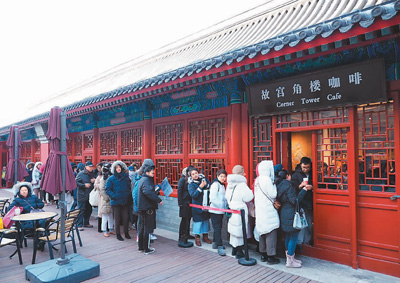


People wait to enter the Corner Tower Cafe, a hot destination among internet users near the Forbidden City. (Photo/People's Daily Overseas Edition)
First emerging as a platform for individuals to share their daily life and connect, social media now has evolved into an economic growth driver which impacts consumption habits in China, especially among the country's younger generations.
Xiaohongshu, also known as RED, a major social media app in China, has multiple "influencers", "vloggers" and "internet celebrities" who promote products and make recommendations on clothes and make-up through pictures and videos.
"I usually scroll through lots of posts on Xiaohongshu, make notes, and select what interests me before I go shopping," said one of the app's users, surnamed Liu.
"When consumers make purchasing decisions, they are often influenced to a large extent by the reference group. One of the main reasons is the individual's sense of identity, that is, what kind of person they think they are and what kind of life they feel they should live," said Ding Ying, associate professor of Renmin Business School at Renmin University of China.
"Once consumers find an identity they are happy with, they are likely to accept what social media recommends and buy into it," Ding added.
Another expert pointed out that for lots of young Chinese consumers, it is about choosing their own lifestyles via social media.
"I'd like to be a person with a broadened horizon, and that's why I want to know what other people are reading and interested in. In other words, I'm building a better version of myself by following others," said one social media user, surnamed Huang.
Apart from figuring out who they really are, young Chinese consumers also tend to reach out to communities they identify with on social media platforms, to help gain a sense of belonging.
On the other hand, the craze for consumption is not a rational trend to follow. Young consumers should set their own limitations to avoid overspending, suggested Ding.
 Fire brigade in Shanghai holds group wedding
Fire brigade in Shanghai holds group wedding Tourists enjoy ice sculptures in Datan Town, north China
Tourists enjoy ice sculptures in Datan Town, north China Sunset scenery of Dayan Pagoda in Xi'an
Sunset scenery of Dayan Pagoda in Xi'an Tourists have fun at scenic spot in Nanlong Town, NW China
Tourists have fun at scenic spot in Nanlong Town, NW China Harbin attracts tourists by making best use of ice in winter
Harbin attracts tourists by making best use of ice in winter In pics: FIS Alpine Ski Women's World Cup Slalom
In pics: FIS Alpine Ski Women's World Cup Slalom Black-necked cranes rest at reservoir in Lhunzhub County, Lhasa
Black-necked cranes rest at reservoir in Lhunzhub County, Lhasa China's FAST telescope will be available to foreign scientists in April
China's FAST telescope will be available to foreign scientists in April "She power" plays indispensable role in poverty alleviation
"She power" plays indispensable role in poverty alleviation Top 10 world news events of People's Daily in 2020
Top 10 world news events of People's Daily in 2020 Top 10 China news events of People's Daily in 2020
Top 10 China news events of People's Daily in 2020 Top 10 media buzzwords of 2020
Top 10 media buzzwords of 2020 Year-ender:10 major tourism stories of 2020
Year-ender:10 major tourism stories of 2020 No interference in Venezuelan issues
No interference in Venezuelan issues
 Biz prepares for trade spat
Biz prepares for trade spat
 Broadcasting Continent
Broadcasting Continent Australia wins Chinese CEOs as US loses
Australia wins Chinese CEOs as US loses